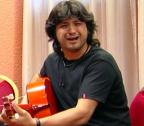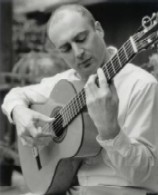Welcome to one of the most active flamenco sites on the Internet. Guests can read most posts but if you want to participate click here to register.
This site is dedicated to the memory of Paco de Lucía, Ron Mitchell, Guy Williams, Linda Elvira, Philip John Lee, Craig Eros, Ben Woods, David Serva and Tom Blackshear who went ahead of us.
We receive 12,200 visitors a month from 200 countries and 1.7 million page impressions a year. To advertise on this site please contact us.
|

|
|
Advice on my soundboard stiffness
|
You are logged in as Guest
|
|
Users viewing this topic: none
|
|
Login  | |
|

   
estebanana
Posts: 9412
Joined: Oct. 16 2009

|
 RE: Advice on my soundboard stiffness (in reply to El Burdo) RE: Advice on my soundboard stiffness (in reply to El Burdo)
|
|
|
When I was in graduate school for the soft headed subject of art we had seminar classes where a group of students and teachers get together for several hours and talk about our work in front of the group. The context of the talk could range from sociology theory to philosophy or linguistics, or any manner of jive that was supposed to be heavy and important. Students used any theoretical means to justify the work they did.
But that is the fault of how academe classes knowledge, there's an epistemology stratification in University and art doesn't fit into the category that has been developed for it. The demand that academe places on art to be discursive has leaked out and pissed on the rest of creative culture and still forces practitioners to elaborate on the work with fanciful verbiage thoughtfully strung together in a vainglorious effort to explain things that basically don't operate under the rules of spoken language.
What I gleaned over the six years I was in academic settings as a student and some time later as a teacher, is that oftentimes it's more productive and honest to just say I don't know.
It's more important to acknowledge that some processes of bringing an object to life are not explainable with language, because the process itself is an internal language which is unspoken. You can hint around using words to describe internalized creative process, but you can't explain it.
When it comes to guitars you get in a muddle of part empirical and part intuitive creating, the empirical part needs a control subject, like a science experiment. The internalized tactile language part is unruly and needs to be given space to do it's thing- it's not part of our rationalized intentions.
Words to explain a process like how guitar tops work don't mean anything unless they are spiked to some empirical framework with an established universal language. That language is vested in words that have absolute values, such as Helmholz, mode, pitch, pole, Hertz, etc. These words have absolute meanings and universally understood as reference points.
Systems of explaining based on internal intuitive language tend to be inaccurate and based on anecdote. Which is fine for the person who makes up that system, because it becomes a personal way of keeping tabs on the nonverbal language inside your own process. Sharing this with others and expecting the same result to occur in guitar making is mighty wishful thinking.
Even if you tried to make two identical guitars on the same plan you couldn't. Each one will have different sounds, and different trade offs of what works and what doesn't.
The problem is that guitar top bracing and voicing can't be transmitted by a rote formula because each guitar is slightly different, even built with the same plan. The rote approach of ' sand brace X or Y doesn't explain the situation or how the guitar works. And if one person spends a lot of time developing a word salad which serves to remind them about how their unspoken process works for them, the rote word salad might be the wrong food for the other person.
Each person who is not engaged in an empirical process has to listen to the unspeaking internal maker to draw the connections between internal and emperical or what is factually and universally known between us.
We're all different and the same rote signposts don't translate into good guitars unless they are rooted in some real evaluation based on the research we have on guitar acoustics. Even then the guitar is so complicated there is no global explaination for how it works. And probably never will be.
_____________________________
https://www.stephenfaulkguitars.com
|
|
|
|
REPORT THIS POST AS INAPPROPRIATE |
Date May 28 2018 1:47:41
 |
|

   
Richard Jernigan
Posts: 3436
Joined: Jan. 20 2004
From: Austin, Texas USA

|
 RE: Advice on my soundboard stiffness (in reply to estebanana) RE: Advice on my soundboard stiffness (in reply to estebanana)
|
|
|
quote:
ORIGINAL: estebanana
<snip>
Words to explain a process like how guitar tops work don't mean anything unless they are spiked to some empirical framework with an established universal language. That language is vested in words that have absolute values, such as Helmholz, mode, pitch, pole, Hertz, etc. These words have absolute meanings and universally understood as reference points.
<another snip>
We're all different and the same rote signposts don't translate into good guitars unless they are rooted in some real evaluation based on the research we have on guitar acoustics. Even then the guitar is so complicated there is no global explaination for how it works. And probably never will be.
From the standpoint of a 43-year career as mathematician, engineer and physicist, and an even longer career as guitar nut and luthier aficionado, I say, "Well said, Stephen."
Of the guitar makers I have read or listened to, the one who seems most to employ standard physics and engineering terminology is Alan Carruth. He has had guitar making students who were science or engineering students at M.I.T. I suppose that may be where he picked up some of the language. But Alan seems to have a natural inclination toward experiment, and a talent for settling guitar folklore issues by devising just the right experiment. He has done quite a lot of measurement related to the guitar.
My favorite quote from Carruth is, "Measurement can distinguish good guitars from bad guitars, but it doesn't yet distinguish good guitars from great guitars."
Just because language and measurement are ill suited to conveying the subtleties of sound and how to achieve it, doesn't mean that skilled makers don't possess valuable and detailed knowledge.
Jose Ramirez III had "mathematical" theories of guitar design. I put the word in quotes because, as far as I could tell, his calculations were nonsense. But Jose III was responsible for quite a large number of great guitars.
RNJ
|
|
|
|
REPORT THIS POST AS INAPPROPRIATE |
Date May 28 2018 3:30:41
 |
|
 New Messages New Messages |
 No New Messages No New Messages |
 Hot Topic w/ New Messages Hot Topic w/ New Messages |
 Hot Topic w/o New Messages Hot Topic w/o New Messages |
 Locked w/ New Messages Locked w/ New Messages |
 Locked w/o New Messages Locked w/o New Messages |
|
 Post New Thread
Post New Thread
 Reply to Message
Reply to Message
 Post New Poll
Post New Poll
 Submit Vote
Submit Vote
 Delete My Own Post
Delete My Own Post
 Delete My Own Thread
Delete My Own Thread
 Rate Posts
Rate Posts
|
|
|
Forum Software powered by ASP Playground Advanced Edition 2.0.5
Copyright © 2000 - 2003 ASPPlayground.NET |
0.09375 secs.
|


 Printable Version
Printable Version




 I need a benchmark
I need a benchmark





 New Messages
New Messages No New Messages
No New Messages Hot Topic w/ New Messages
Hot Topic w/ New Messages Hot Topic w/o New Messages
Hot Topic w/o New Messages Locked w/ New Messages
Locked w/ New Messages Locked w/o New Messages
Locked w/o New Messages Post New Thread
Post New Thread